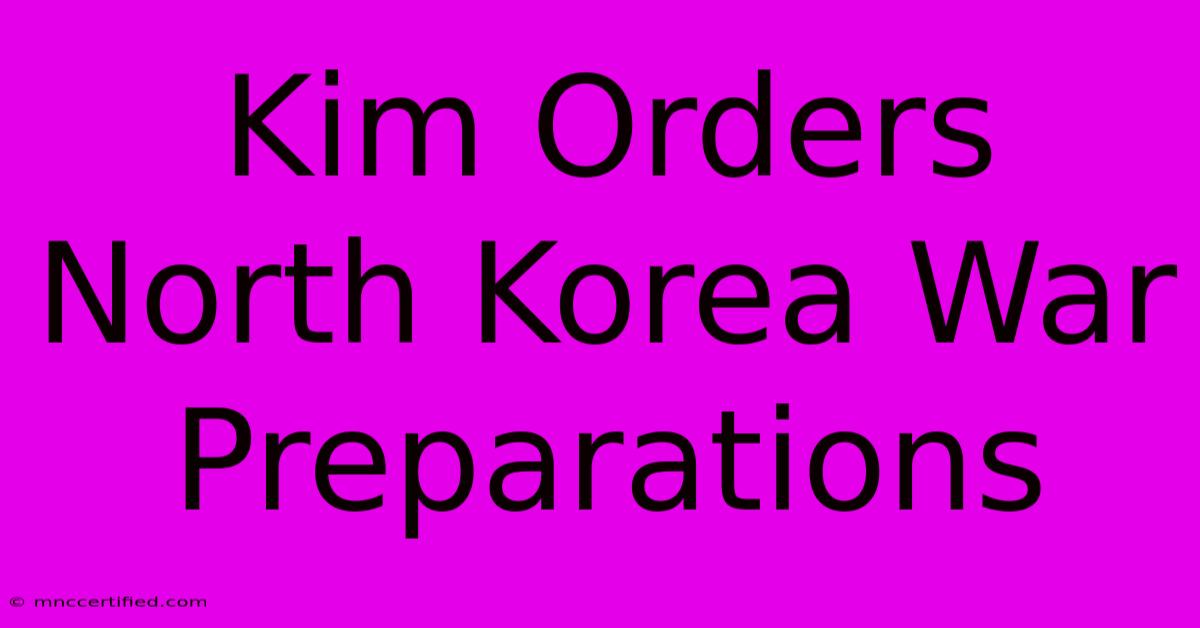Kim Orders North Korea War Preparations

Table of Contents
Kim Orders North Korea War Preparations: Heightened Tensions on the Korean Peninsula
Recent reports indicate that North Korean leader Kim Jong Un has ordered the country's military to prepare for war. This alarming development significantly escalates tensions on the Korean Peninsula and raises concerns about regional and global stability. Understanding the context, implications, and potential responses is crucial.
Understanding the Current Situation: What are the Triggers?
While the exact reasons behind Kim Jong Un's order remain unclear, several factors likely contribute to the heightened military readiness:
-
Joint US-South Korea Military Drills: Large-scale military exercises conducted by the US and South Korea are often cited by North Korea as provocative acts, justifying its own military buildup and aggressive rhetoric. These drills, viewed as a rehearsal for a potential conflict, understandably trigger heightened anxiety in Pyongyang.
-
Sanctions and International Pressure: The international community's sanctions imposed on North Korea over its nuclear weapons program continue to exert economic pressure. These sanctions, perceived by North Korea as an act of aggression, may fuel a desire for a more assertive stance.
-
Internal Political Dynamics: Some analysts suggest that the war preparations could be a display of strength aimed at consolidating Kim Jong Un's power within the ruling party, or a response to internal economic challenges. Demonstrating military might can be a potent tool for maintaining control.
-
Technological Advancements: North Korea's continued advancements in its ballistic missile and nuclear weapons programs may embolden the regime, increasing its willingness to engage in more aggressive posturing.
Implications of North Korea's War Preparations: A Regional and Global Threat
The implications of Kim Jong Un's order are severe and far-reaching:
-
Increased Risk of Conflict: The heightened military readiness dramatically increases the risk of accidental or intentional conflict, potentially escalating into a wider regional war. The possibility of miscalculation is a serious concern.
-
Humanitarian Crisis: Any conflict on the Korean Peninsula would inevitably lead to a massive humanitarian crisis, with potentially millions displaced and in need of urgent aid. The already fragile situation in North Korea would worsen significantly.
-
Global Economic Instability: A conflict would severely disrupt global supply chains and energy markets, leading to significant economic instability. The impact would be felt worldwide.
-
Nuclear Threat: The possibility of North Korea using its nuclear weapons, however remote, remains a terrifying prospect with devastating global consequences.
International Response: Navigating a Delicate Situation
The international community faces the challenge of responding to North Korea's actions while avoiding further escalation. Diplomatic efforts are crucial:
-
Strengthened Dialogue: Renewed efforts towards diplomatic engagement and dialogue are paramount to de-escalate the situation and find a peaceful resolution. Open communication channels are vital.
-
Strengthened Sanctions: Some advocate for tightening existing sanctions or imposing new ones to pressure North Korea to change course. However, the effectiveness of sanctions is debated.
-
Regional Cooperation: Close collaboration among regional allies, including South Korea, Japan, and the US, is essential for coordinating responses and sharing intelligence.
-
International Pressure: A united front from the UN Security Council and other international bodies is necessary to exert maximum pressure on North Korea to de-escalate.
Conclusion: The Urgent Need for Peace and Diplomacy
Kim Jong Un's order for war preparations presents a grave threat to peace and stability on the Korean Peninsula and beyond. The situation demands urgent attention and a concerted international effort to de-escalate tensions through diplomacy and prevent a devastating conflict. The focus must remain on peaceful resolution and preventing a humanitarian catastrophe. Ignoring the issue or resorting to solely military solutions risks dire consequences. A comprehensive and multifaceted approach is the only viable path forward.

Thank you for visiting our website wich cover about Kim Orders North Korea War Preparations. We hope the information provided has been useful to you. Feel free to contact us if you have any questions or need further assistance. See you next time and dont miss to bookmark.
Featured Posts
-
Dune Prophecy Episode Release Dates
Nov 19, 2024
-
Portugal Praised For Hotel Investment
Nov 19, 2024
-
New Gmail Feature Email Aliases
Nov 19, 2024
-
Shelter Insurance Madisonville Ky
Nov 19, 2024
-
Japans Rare Mineral A Billions Boon
Nov 19, 2024